A pop-up survey could appear while you're here --curious what it's for? Click here to learn more!
×Community resources
Community resources
Community resources
Practical Guide to Enterprise Test Management Strategy
Great day everyone, I am Peter Tran and today, let's discuss enterprise test management challenges and how we can deal with them, successfully!!!
In software development, managers often move from handling tests in small projects to navigating the complex terrain of enterprise-scale projects, encountering many complexities and nuanced challenges. While small projects offer simplicity and flexibility in testing, large-scale enterprises demand a more robust and systematic approach. Consequently, this evolution in scale requires understanding the unique challenges, benefits, and strategies that underpin successful enterprise test management. Today, we will explore these aspects, highlighting the transformative role that tools like AgileTest and Enterprise Test Management for Jira play in changing the landscape of enterprise test management.
Challenges in Enterprise Test Management
In enterprise-scale projects, the shift from managing simpler systems to navigating complex, multi-layered environments presents significant challenges. These projects typically involve a diverse array of technologies. Additionally, they often require coordination with multiple vendors. This necessitates a sophisticated and top-down approach to test management. Meanwhile, the complexity is heightened by integrating varied components like databases, operating systems, and networks. In today’s fast-paced development cycle, many enterprises release software builds daily. Consequently, balancing speed with quality is a critical concern. Therefore, it is essential to adopt an adaptive testing strategy. Such a strategy must evolve with the ever-changing technological landscape and project demands.
Benefits of Enterprise Test Management Strategy (ETMS)
The strategic implementation of an Enterprise Test Management Strategy (ETMS) brings numerous benefits essential for an organization’s success and growth. In landscapes where health and human services organizations prioritize improving ways of working, ETMS plays a crucial role. It embeds quality across the IT strategic planning process. Consequently, integrating ETMS into IT strategy has a significant impact. It affects organizations’ operational blueprints, ensuring that quality and value are interwoven throughout their operations.
An effective ETMS enables organizations to plan and address challenges in complex business and technology environments. Subsequently, this involves managing multiple vendors and technologies. In today’s competitive landscape, the ability to innovate and respond quickly to market demands is crucial. Thus, ETMS becomes an essential tool, being adaptive, scalable, and comprehensive. It aids IT teams in delivering quality and value, benefiting both customers and the workforce.
By implementing ETMS, organizations align their quality assurance plans with business strategies, thereby transforming the IT function into a value-driven, trusted business partner. This strategic approach not only enhances the organization’s ability to deliver high-quality software but also supports top and bottom-line growth priorities. Consequently, the impact of a well-executed ETMS extends beyond the IT department. Ultimately, it fosters a culture of quality and excellence throughout the organization.
Practical Solutions for Enterprise Test Management
Addressing these challenges requires a multi-faceted approach. Implementing an Enterprise Test Management Strategy (ETMS) involves a blend of strategic alignment, innovative methodologies, and efficient resource utilization. Key approaches include:
- Organizational Framework: Developing a robust organizational framework is essential. Therefore encompasses defining the testing team’s structure, aligning testing functions with broader organizational goals, and assigning clear roles and responsibilities within the testing team.
- Adaptive Testing Approach: Continually updating testing strategies to align with evolving industry standards and project requirements is crucial. To elaborate, this involves a flexible approach to various testing methodologies, ensuring they fit the unique needs of each project.
- Standardized Test Coverage Metrics: Establishing standardized metrics for test coverage enables consistent evaluation of testing effectiveness across projects.
- Continuous Testing and Automation: Embracing continuous testing and automation enhances the efficiency of the testing process, ensuring reliability and consistency in test results.
- Effective Management of Test Resources: Efficiently managing test environments, data, and cases is vital, particularly in complex settings. Therefore, this includes defining the test environment setup, managing test data responsibly, and streamlining test case management.
- Quality Control and Defect Management: Actively managing quality and defects is crucial. Thus, this involves setting clear quality benchmarks and establishing a robust process for identifying and addressing defects.
- Empowering Teams with ETMS Tools: Providing teams with the necessary tools, processes, and best practices for effective ETMS utilization is important. This also includes integrating ETMS processes with existing development and DevOps workflows. With powerful features and effective interfaces, AgileTest & Enterprise Test Management for Jira proves to be one of the most outstanding tools that supports enterprise projects.
These refined strategies emphasize a comprehensive approach, combining strategic oversight with adaptable testing practices and effective resource management, crucial for successful enterprise test management.
AgileTest & Enterprise Test Management for Jira
AgileTest App stand out as indispensable tools in the enterprise test management domain. They offer comprehensive features:
- Overview: a test overview typically includes a summary of all testing activities, giving stakeholders a high-level view of the testing process, progress, and outcomes.
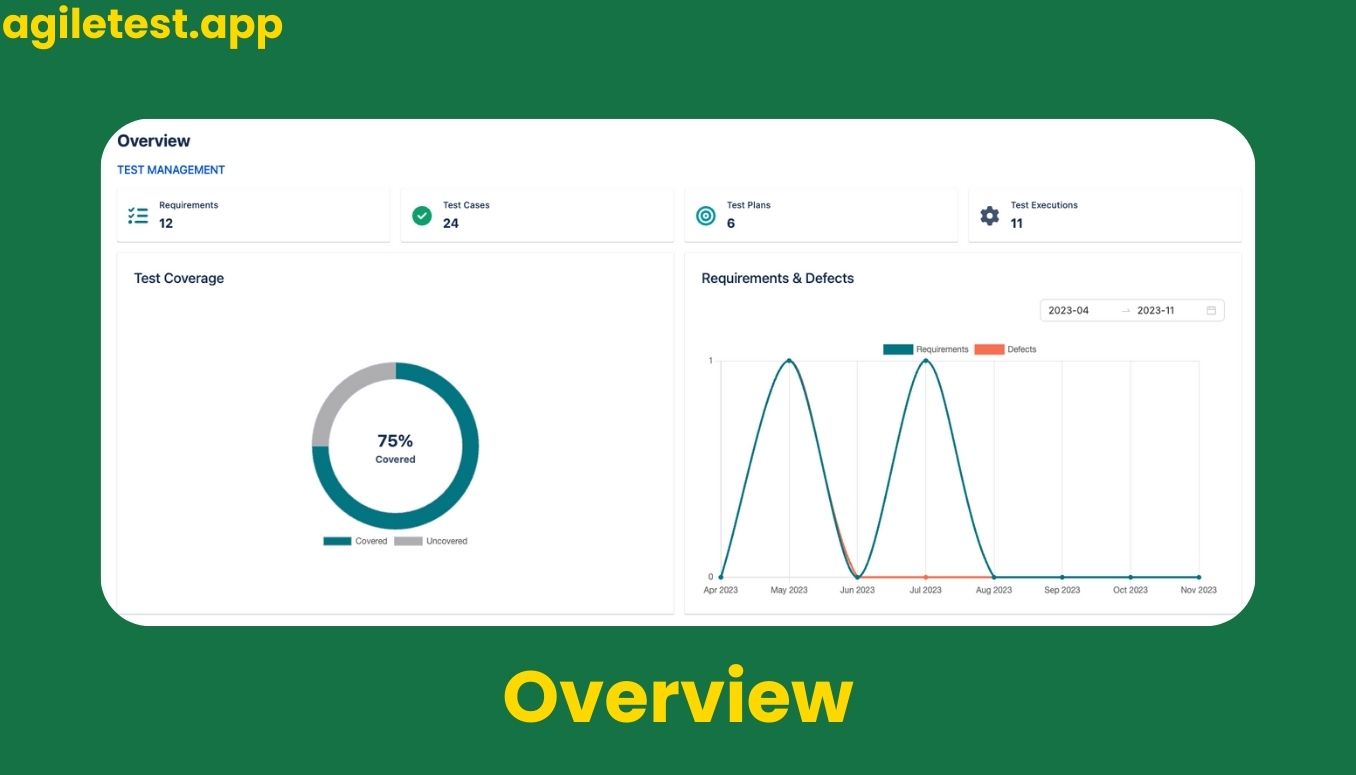
- Test Script: A test script in AgileTest is a set of detailed instructions that outline the steps, conditions, inputs, and expected outcomes for executing a test case. It is essential for automating or manually executing tests, ensuring the software meets its functional and non-functional requirements.
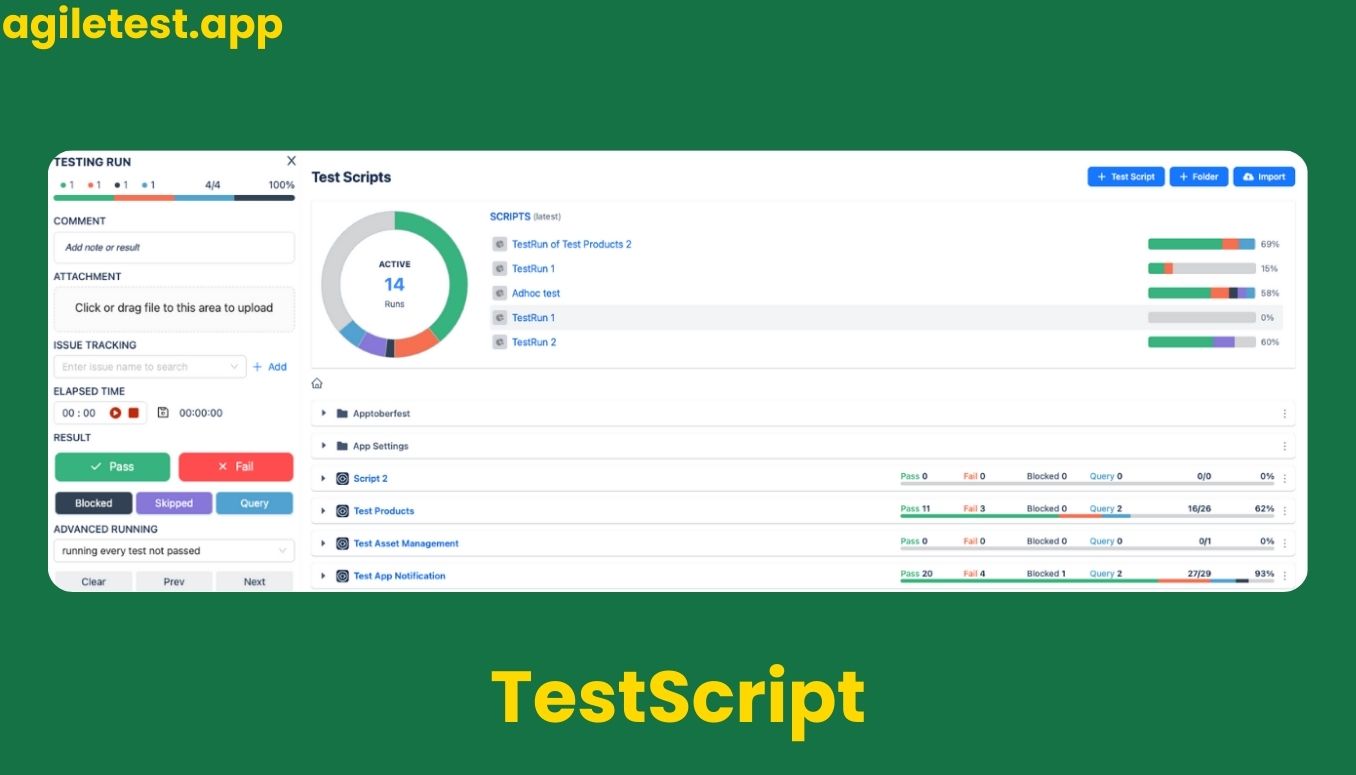
- Test Sessions: The latest AgileTest release has enhanced the user interface for managing Test Sessions, making the process more intuitive and efficient. This improvement simplifies managing testing assets, ensuring focus on software quality.
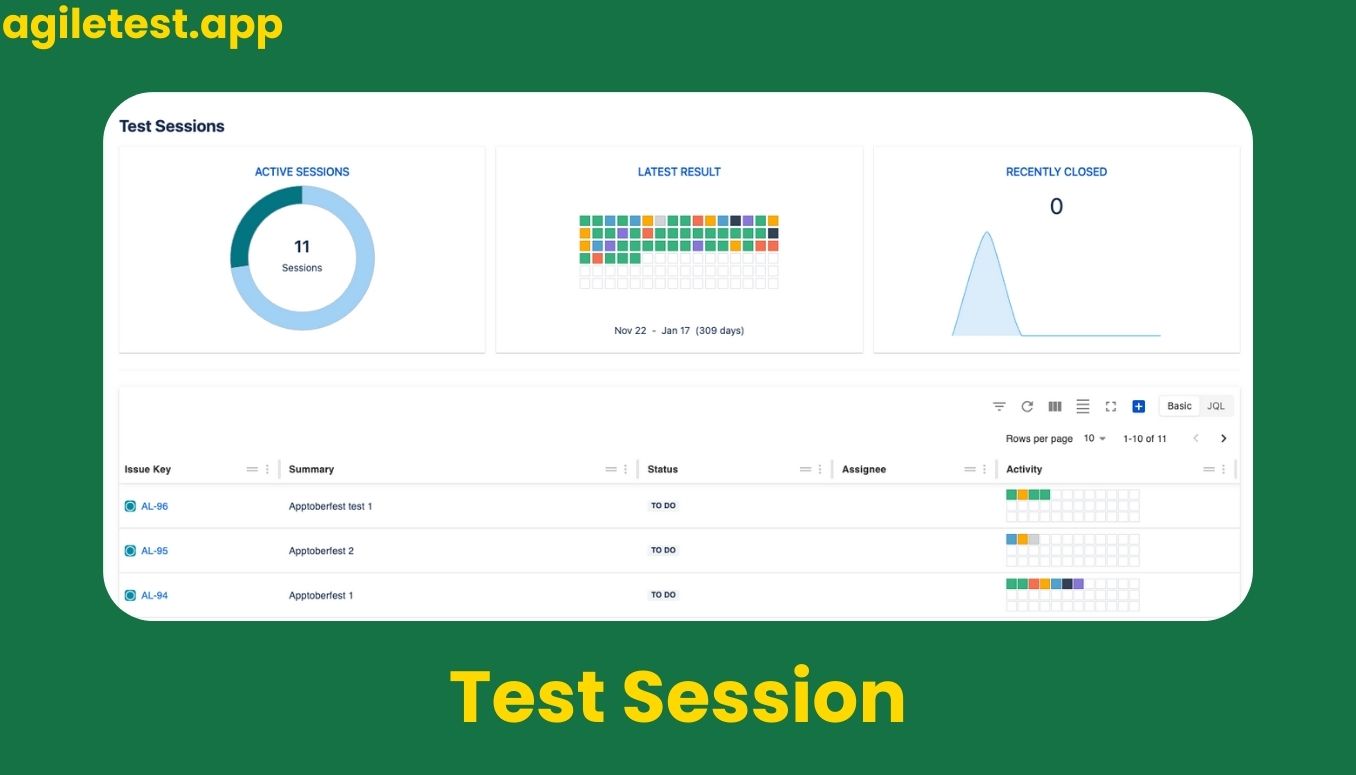
- Requirements: In AgileTest, requirements form the foundation of tests. From these, managers can develop test plans and create or import test cases. Ensuring full coverage of every requirement is the ultimate goal, which speaks to the thoroughness of the testing process.
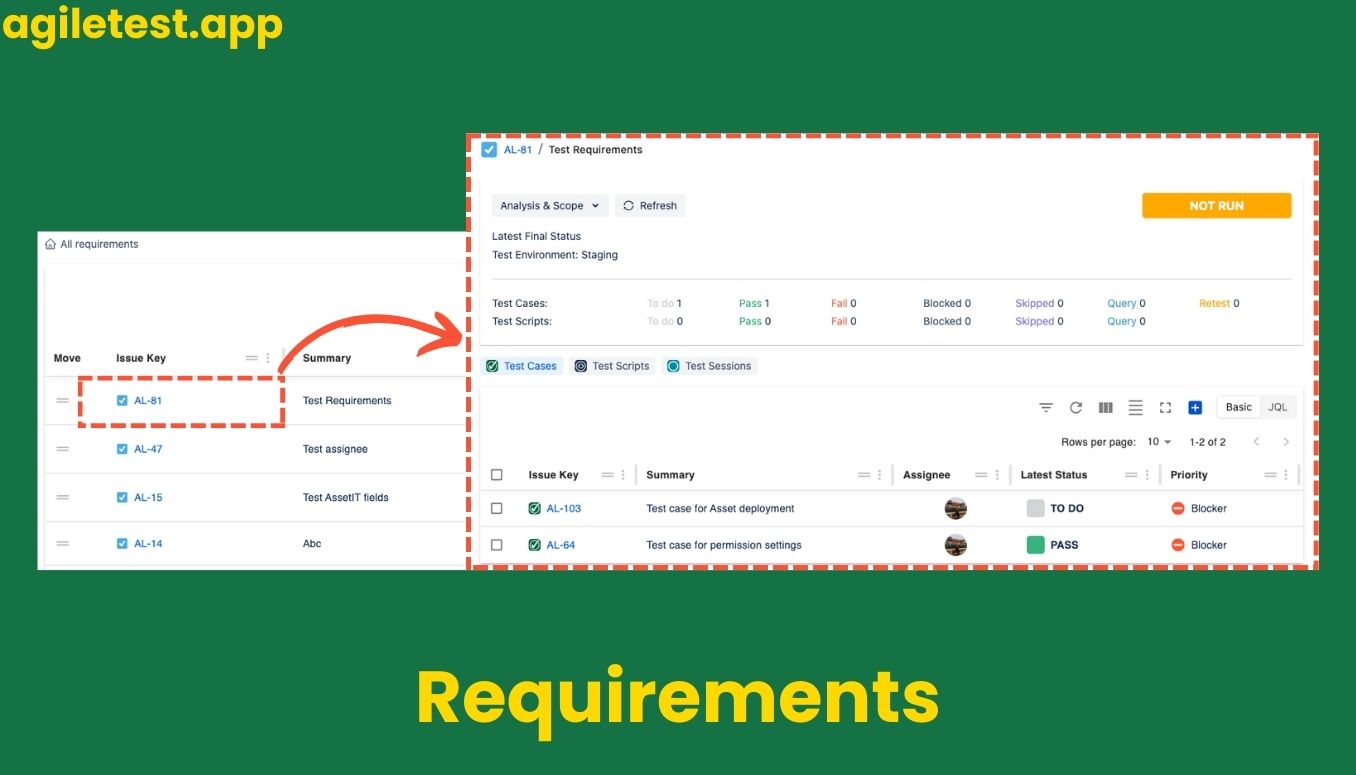
- Preconditions: Preconditions are specific conditions that must be met before executing a test case.This feature ensures the system or application is in the desired state. Additionally, it meets the necessary prerequisites for the test, such as having an authorized account for testing a login feature.
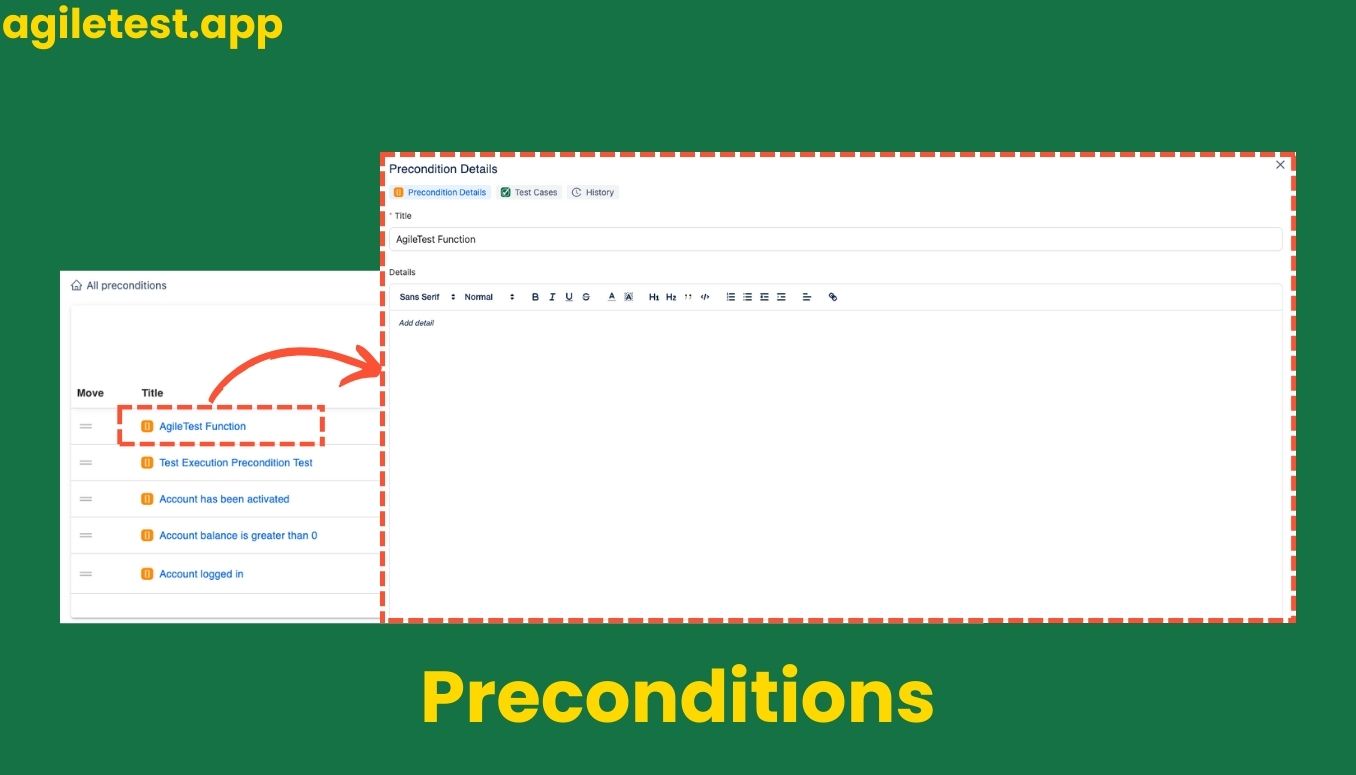
- Test Case: A test case in AgileTest is a documented set of conditions or steps defining the inputs, actions, and expected results for testing a specific aspect of a software application. It is crucial for verifying functionality, performance, or other quality attributes.
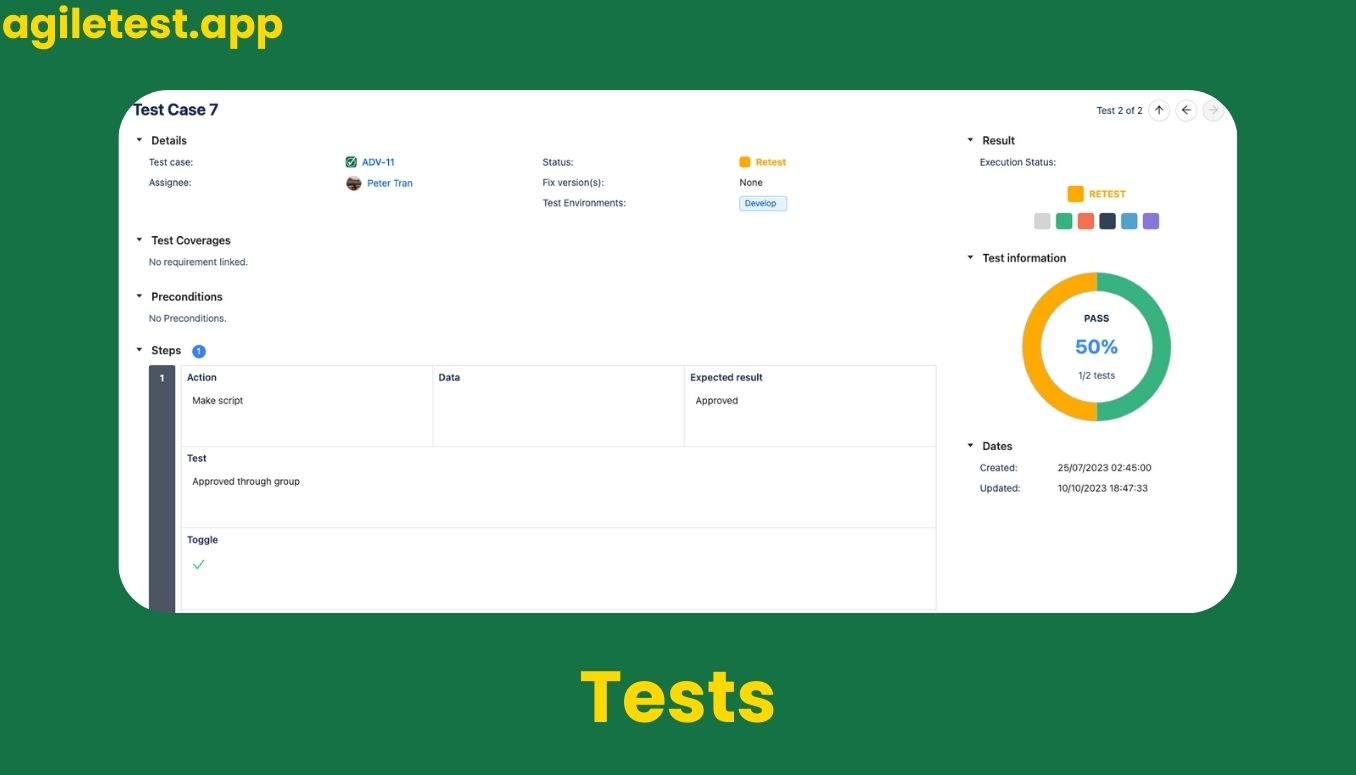
- Test Plans: Test planning in AgileTest involves creating a comprehensive strategy for conducting testing activities. This phase includes identifying test objectives, defining the test scope, allocating resources, determining test techniques and methodologies, and establishing a testing timeline.
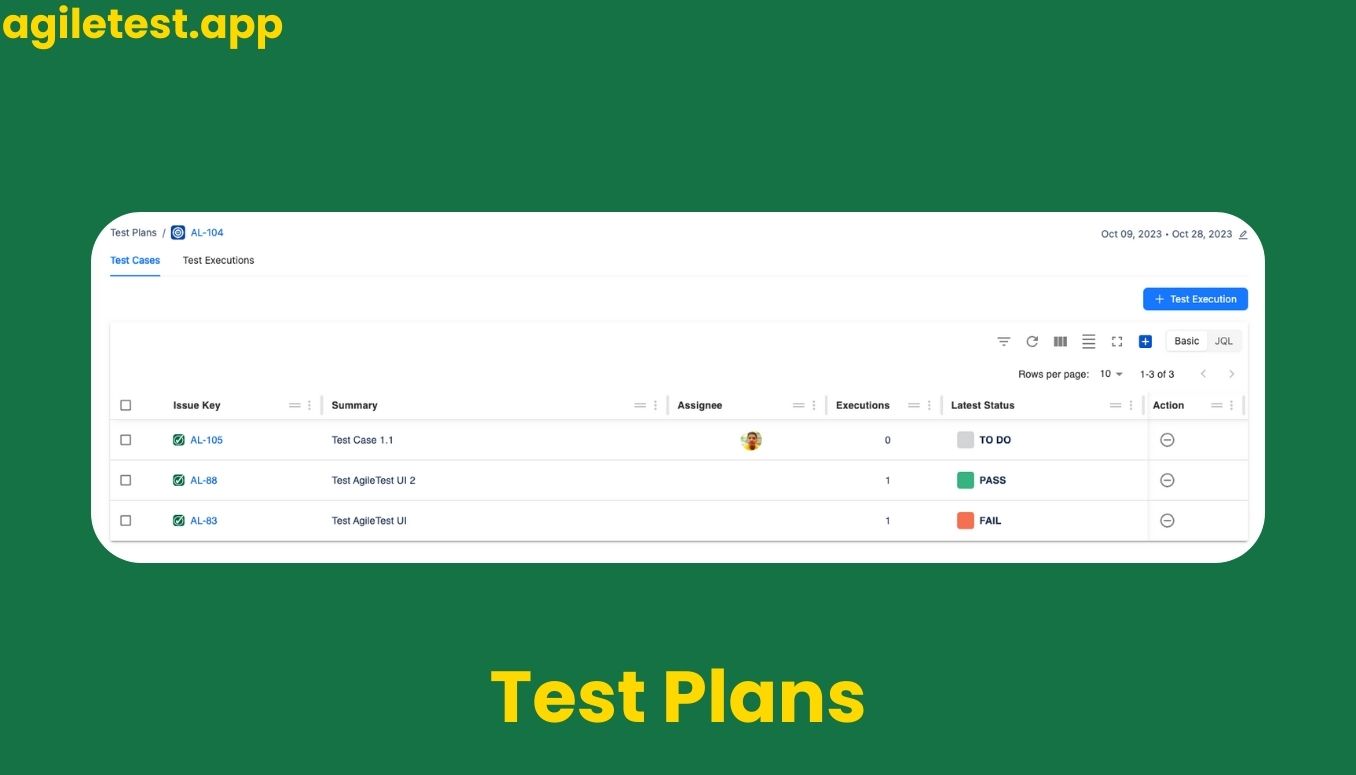
- Test Execution: This refers to running test cases and assessing the actual behavior of the software or system being tested. It involves executing predefined test cases, capturing the results, and comparing them against expected outcomes to verify software functionality and requirements.
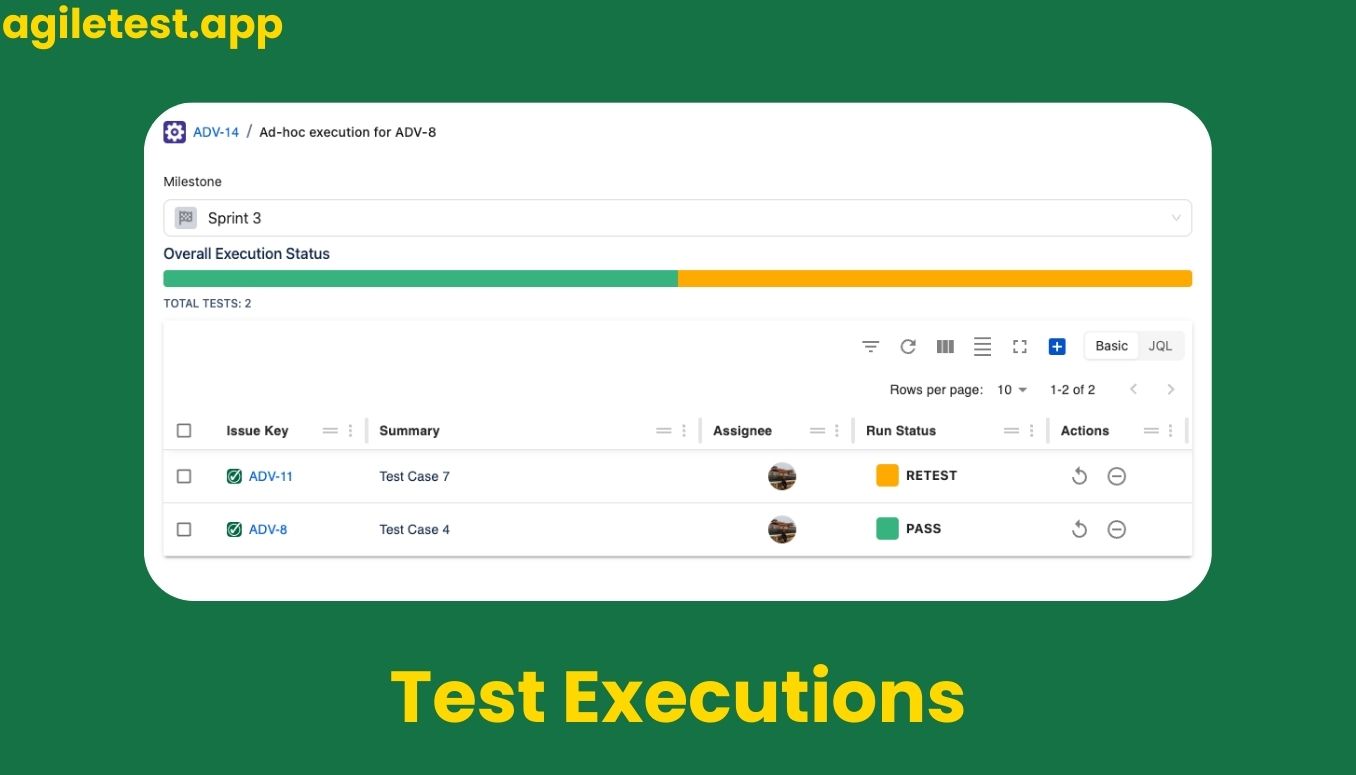
- Milestone: AgileTest’s Sprint Test feature allows the association of tests with specific sprints, enabling alignment of testing efforts with development cycles. This feature likely includes setting and tracking milestones for better test management.
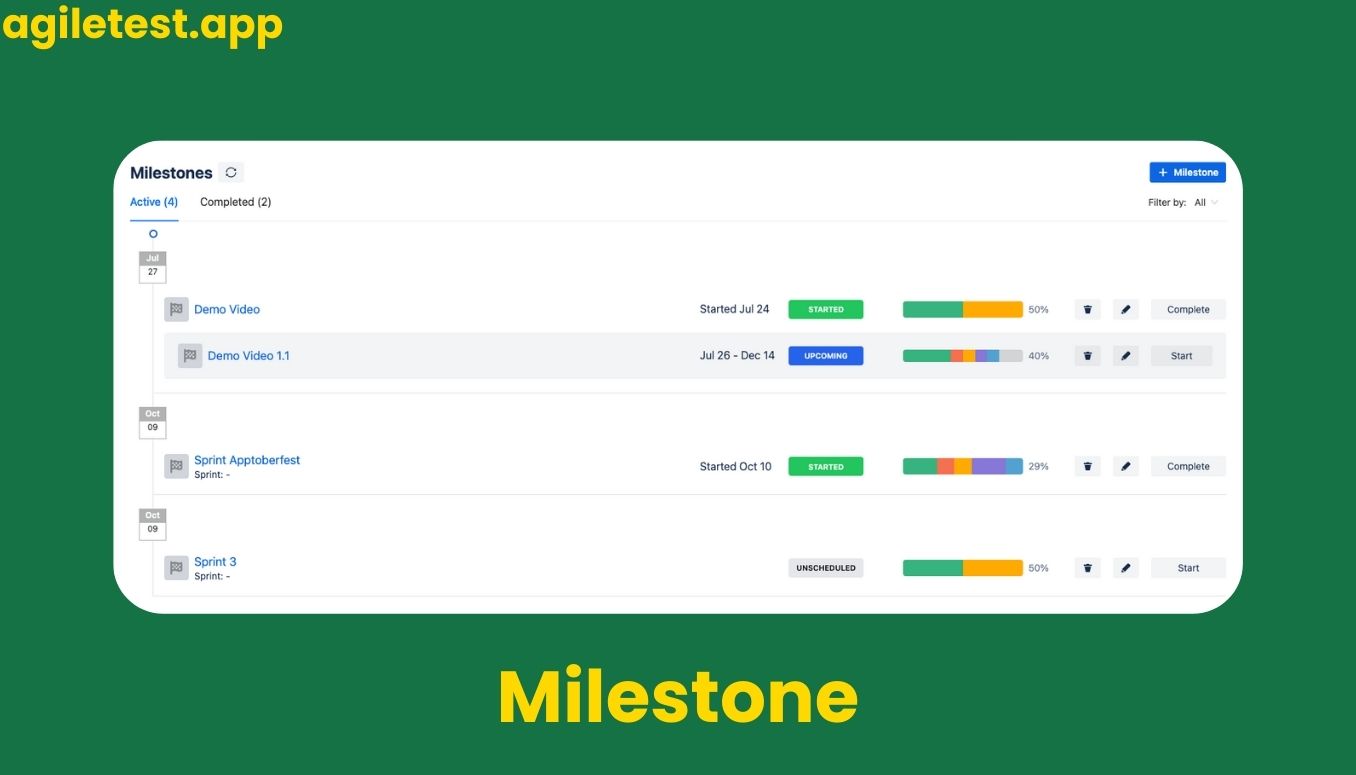
- Sprint: The Sprint Test allows efficient association of tests with specific sprints in agile methodologies like Scrum, linking milestones to sprints for better management. This feature aligns testing efforts with development cycles, enhancing the agility of the testing process.
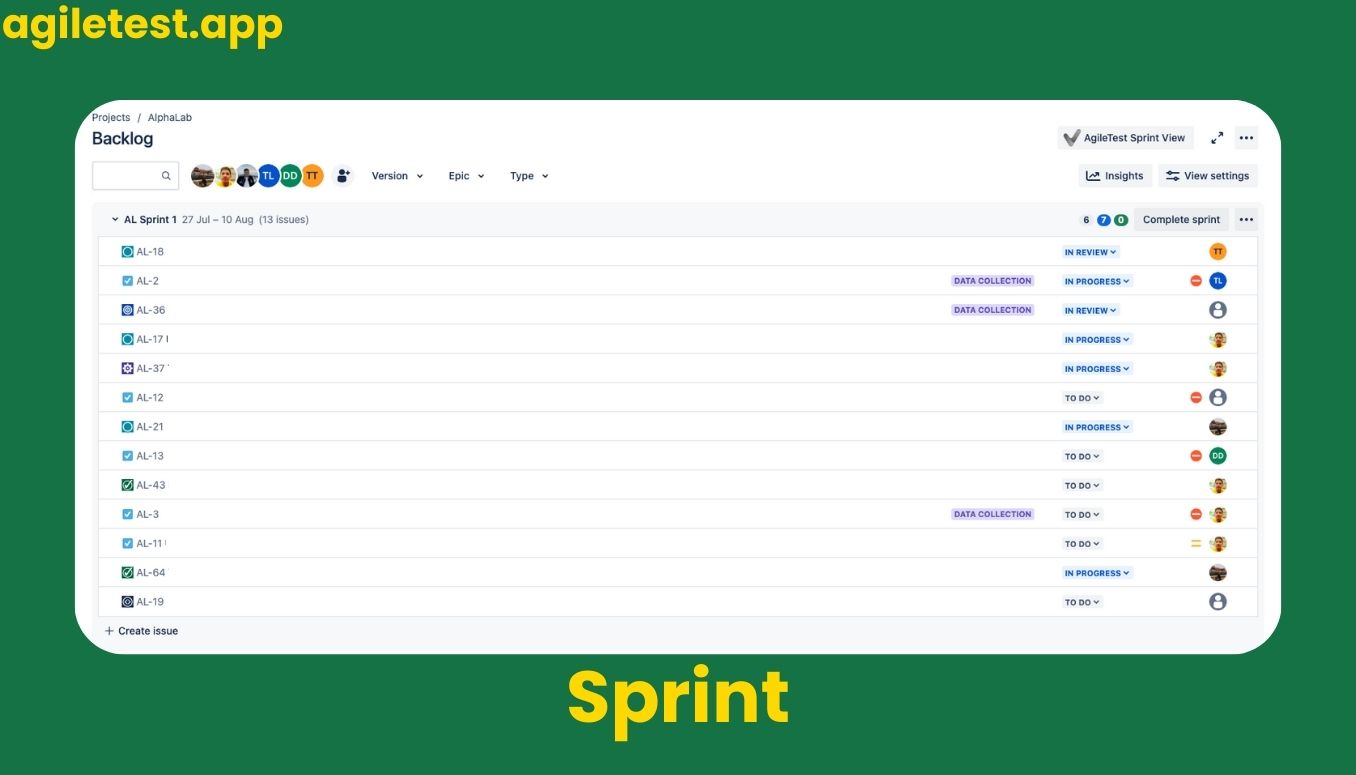
- Reports: The Report Feature in AgileTest offers a comprehensive summary of test case results. The Reports feature includes a Test Coverage report. This report calculates issue coverage and analyzes requirement statuses. Additionally, there is a Test Traceability report. It provides detailed information for requirements, test cases, test plans, test runs, and defects. This allows users to view even the minutest details, changes, and updates in test case management.
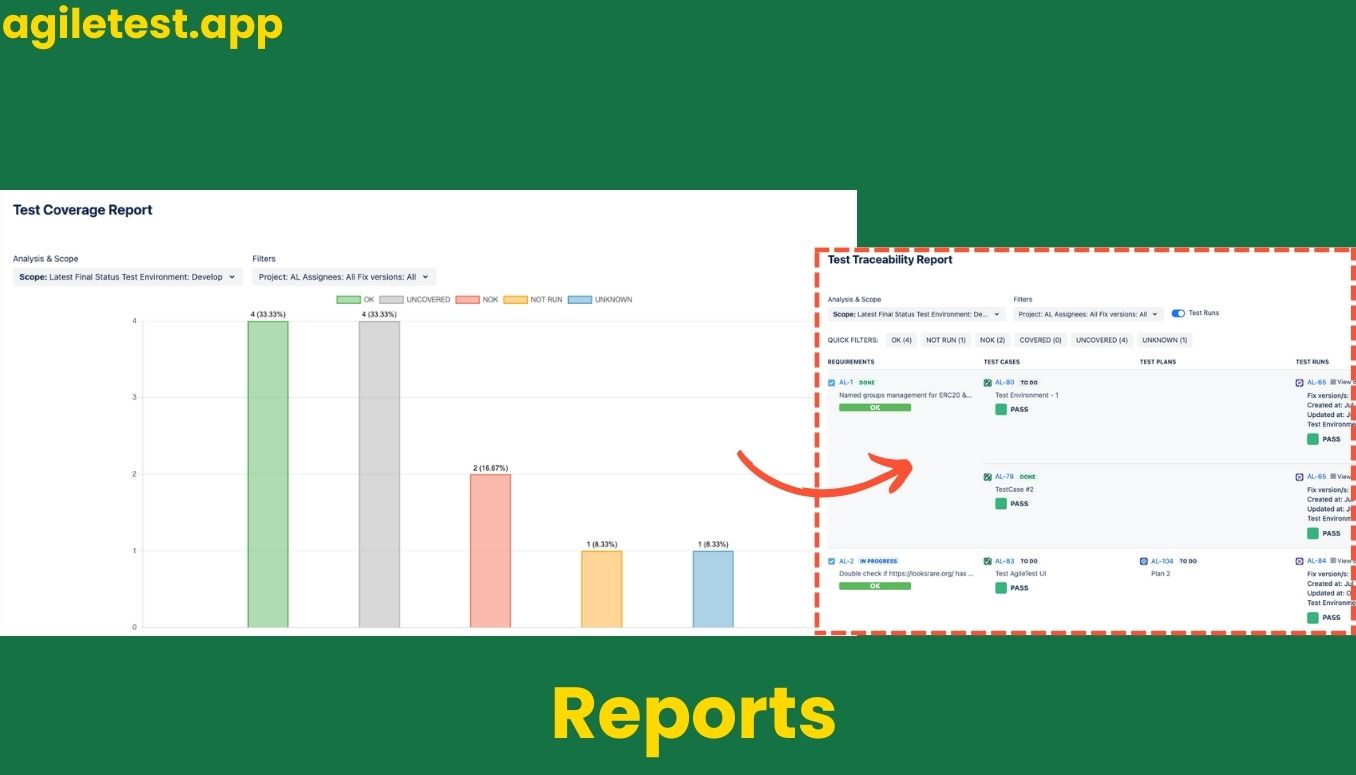
Collectively, these features provide a robust framework for managing large-scale testing processes, ensuring high software quality, and aligning with business objectives in enterprise environments.
Furthermore, these features facilitate effective test planning and execution. They also enhance test coverage and efficiency. Additionally, they provide valuable insights into the testing status. This revolutionizes test case creation, review, and maintenance. The tools’ emphasis on collaboration and communication ensures seamless work across different locations and time zones. This fosters a culture of open communication among cross-functional teams. Moreover, extensive reporting and analysis capabilities enable stakeholders to make informed decisions based on clear and concise test metrics.
Conclusion
To summarize our discussion, AgileTest and Enterprise Test Management for Jira App stand out as comprehensive solutions in enterprise test management. With their advanced features, they provide essential tools for efficient large-scale testing. These tools are key to ensuring high software quality and aligning with business objectives.
In conclusion, the move to enterprise-scale test management brings both challenges and opportunities. Crucially, leveraging tools like AgileTest and Enterprise Test Management for Jira App is essential. These tools empower organizations to effectively manage complex software projects, ensuring quality, efficiency, and alignment with broader business goals.
If you love the testing experiences, try our app on the Atlassian Marketplace!
Was this helpful?
Thanks!
Peter_DevSamurai
About this author
Product Marketer
DevSamurai
Japan
39 accepted answers

0 comments